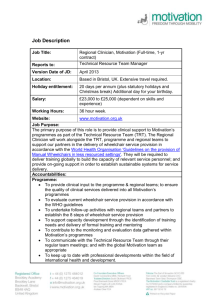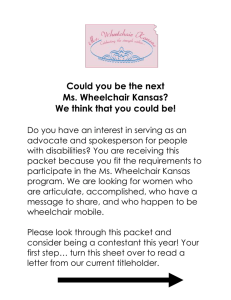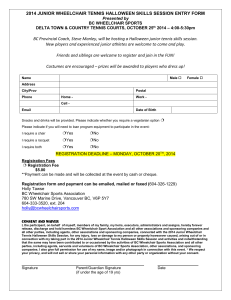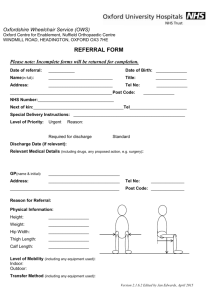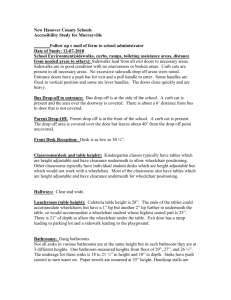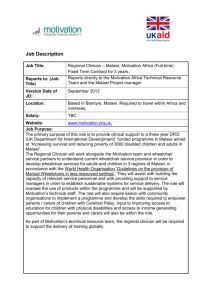Whizz-Kidz consultation response
advertisement
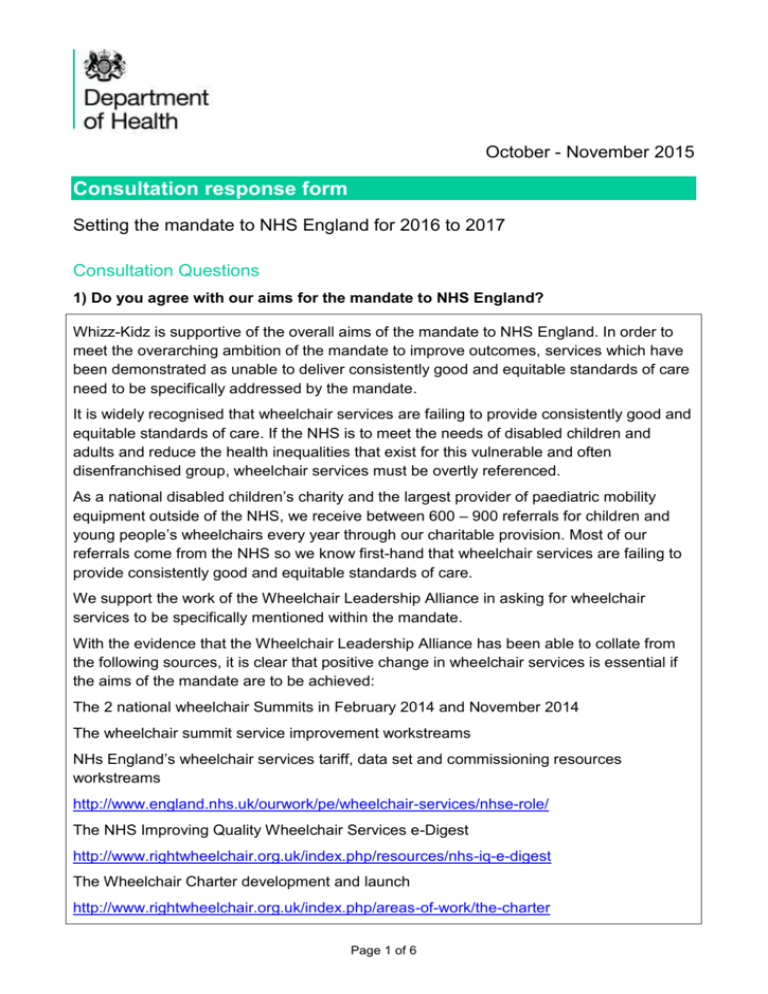
October - November 2015 Consultation response form Setting the mandate to NHS England for 2016 to 2017 Consultation Questions 1) Do you agree with our aims for the mandate to NHS England? Whizz-Kidz is supportive of the overall aims of the mandate to NHS England. In order to meet the overarching ambition of the mandate to improve outcomes, services which have been demonstrated as unable to deliver consistently good and equitable standards of care need to be specifically addressed by the mandate. It is widely recognised that wheelchair services are failing to provide consistently good and equitable standards of care. If the NHS is to meet the needs of disabled children and adults and reduce the health inequalities that exist for this vulnerable and often disenfranchised group, wheelchair services must be overtly referenced. As a national disabled children’s charity and the largest provider of paediatric mobility equipment outside of the NHS, we receive between 600 – 900 referrals for children and young people’s wheelchairs every year through our charitable provision. Most of our referrals come from the NHS so we know first-hand that wheelchair services are failing to provide consistently good and equitable standards of care. We support the work of the Wheelchair Leadership Alliance in asking for wheelchair services to be specifically mentioned within the mandate. With the evidence that the Wheelchair Leadership Alliance has been able to collate from the following sources, it is clear that positive change in wheelchair services is essential if the aims of the mandate are to be achieved: The 2 national wheelchair Summits in February 2014 and November 2014 The wheelchair summit service improvement workstreams NHs England’s wheelchair services tariff, data set and commissioning resources workstreams http://www.england.nhs.uk/ourwork/pe/wheelchair-services/nhse-role/ The NHS Improving Quality Wheelchair Services e-Digest http://www.rightwheelchair.org.uk/index.php/resources/nhs-iq-e-digest The Wheelchair Charter development and launch http://www.rightwheelchair.org.uk/index.php/areas-of-work/the-charter Page 1 of 6 Consultation response form The Right Chair Right Time Right Now Campaign http://www.rightwheelchair.org.uk 2) Is there anything else we should be considering in producing the mandate to NHS England? Include more specific service improvement targets for NHS England within the mandate which would enable specific steers for CCG improvement programmes; this should include a need for improvement in wheelchair services. Overtly referencing the need for improvement in wheelchair services would give a mandate to NHS England to enable wheelchair users to access a service that meets their needs, improve health and patient safety, reduce NHS on costs associated with poor or no provision, enable integration of services and budgets and improve quality of life for disabling long term conditions and life limiting conditions. We believe that wheelchair services could be used as an exemplar to demonstrate the aim of setting a mandate of long term duration, especially in setting budgets for 3 or more years. It would have huge positive impact on a large, vulnerable and often disenfranchised health population. Prescribing the right chair and postural support by looking at the whole lifetime cost of the equipment, cannot be achieved within an annual budget but would bring efficiencies and significant cost savings over a longer period. 3) What views do you have on our overarching objective of improving outcomes and reducing health inequalities, including by using new measures of comparative quality for local CCG populations to complement the national outcomes measures in the NHS Outcomes Framework? The overarching objectives are to be commended and using comparative measures to achieve nationally consistent outcomes is important. To achieve the objectives, services which have never before been given any priority, need to come alongside those already in the public domain. It is therefore essential that wheelchair services are addressed within the mandate. Significant variation persists in wheelchair service provision and where provision is poor, significant harm, waste and delays result. Disabled children and young people are on waiting lists without any equipment or with an ill-fitting wheelchair for too long – on average its two years, and in many cases longer. Reformed care pathways for wheelchair services which deliver high quality patient care and best value for money should be mandated to prevent unintended harm with expensive Page 2 of 6 Consultation response form secondary consequences such as pressure sores and fractures, exacerbation of ill health for the wheelchair users and completely avoidable carer burden. In expecting NHS England to work with CCGs and other partners to reduce variations in quality of care and outcomes at a local level, the areas of greatest variation in quality of care and outcomes should be specified and given priority. One such area is wheelchair provision. If included in the mandate, then NHS England will be empowered to influence and guide all CCGS to bring their services in line, ensuring a national quality standard is in place 4) What views do you have on our priorities for the health and care system? Q4 : Referencing individual priorities in the mandate: We agree with the priorities for the health and care system. There is no doubt that within the priorities, wheelchair services should be specifically mentioned in order that improvement changes can be effected that work towards all the priorities as described. Without a national mandate to improve wheelchair services the NHS will fail to meet the needs of disabled children and young people and the mandate will not meet its objectives. Preventing ill health and supporting people to live healthier lives Significant variation currently exists in wheelchair service provision and where provision is poor significant harm, waste and delays result. Reformed care pathways for wheelchair services which deliver high quality patient care and best value for money should be mandated to prevent unintended harm and prevent exacerbation of ill health. Wheelchair users should be specifically mentioned if this is to happen Creating the safest, highest quality health and care service Implementing quality standards and working in a holistic manner with wheelchair users, their families and carers, social care, education and work could produce improvements in health, wellbeing and independence as well as have positive effects on NHS budgets and promote innovation, integration and efficiency. Ensuring provision of the right chair at the right time is imperative if harm, waste and Page 3 of 6 Consultation response form delays are to be avoided. Wheelchair services should be overtly included as a programme of work to improve patient safety and reduce harm Making wheelchair services a priority improvement area for CCGs, will bring about huge improvements in patient and carer experience to what is currently an overlooked and vulnerable, yet important, group of people. Maintaining and improving performance against core standards while achieving financial balance There a range of long term health and economic benefits to providing appropriate mobility equipment. For example the right wheelchair can prevent disabled children and adults from developing pressure sores. It could potentially save hospitalisation at a cost on average of £4,000, and even spinal surgery that can carry a cost of £40,000. Whizz-Kidz has worked in partnership with 12 NHS Wheelchair Services nationally in order to improve the wheelchair service for their customers. Our flagship service is at Tower Hamlets and we have been collaborating with Tower Hamlets Wheelchair Service since 2007. In our first year of collaboration we saved the service £250K. Improving wheelchair services can affect major benefits to the economy. A report by Frontier Economics demonstrated Whizz-Kidz’s Social Return on Investment and showed that for every £1 spent by the charity on the appropriate wheelchair, between £10 and £65 is generated for the economy as young people gain increased independence and can take up more education and employment opportunities. Transforming out-of-hospital care 3.19 ‘objective for NHS England to support the transformation of out-of-hospital care using whole system approaches to ensure people get the right care in the right place at the right time. For 2016/17 this would also mean the continuation of the Better Care Fund’ We would urge demonstrating this using wheelchair services as an exemplar, where ensuring provision of the right chair at the right time is imperative if harm, waste and delays are to be avoided. Include wheelchair services as an improvement programme to improve patient safety and reduce harm Driving improvements in efficiency and productivity We would suggest that Wheelchair services would be a perfect exemplar by using innovative and flexible budgeting, working with key partners to strengthen integration Page 4 of 6 Consultation response form across health, social care, work and education and enabling the accommodation of individual needs, independence health and wellbeing. We would suggest that there should be a two-year programme of Quality, Innovation, Productivity and Prevention (QIPP) activity to deliver quality and efficiency improvements within wheelchair services. Supporting research, innovation and growth By supporting clinicians, manufacturers and independent organisations working together, innovative, affordable products and solutions can be developed within wheelchair services Whizz-Kidz has identified some potential and high impact solutions to support the NHS to deliver better outcomes for wheelchair users and cost savings. This includes online applications and care plans, a ‘Chair in a Day’ model, innovative procurement and service provision and mobile assessments and delivery. 5) What views do you have on how we set objectives for NHS England to reflect their contribution to achieving our priorities? How the objectives are set inevitably produces general statements and without specifically directing the mandate, marginalised services will persist with variable standards and a postcode lottery. If standards are to be driven up, creation of cost efficient and quality standards have to be mandated and shared throughout the CCGs. This is why it is so important that wheelchair services improvement must be referenced specifically within the NHS mandate. Whizz-Kidz knows first-hand how providing the right wheelchair early enough in a child’s life can have a massive impact on their development, independence and freedom. The objectives set in the NHS mandate cannot be met if a vulnerable group of patients with long term and / or life limiting conditions (circa 1.2 million) is left on the side-lines. Without inclusion in the mandate CCGs will continue to discount wheelchair services as a priority and the inequalities in experience of care and outcomes will persist within a postcode lottery. Wheelchair services were recognised in the 2014/16 mandate under Mandate 4, (supporting people with long term conditions) which stated “Develop an outcomes based specification for wheelchair services by December 2014” and which so far, remains undelivered. It is imperative that the service continues to be developed to a quality standard, which will assist CCGs and integrated services in working to achieve quality of life improvements for patients and carers, whilst bringing significant cost benefit to the Page 5 of 6 Consultation response form system. Wheelchair services could be a superb exemplar of the overarching aims if overtly included in the new mandate and would bring a service that has been consistently marginalised up to the standard of care that would be expected of a modern NHS, reducing health inequalities that impact on a significant sector of the population. Page 6 of 6
